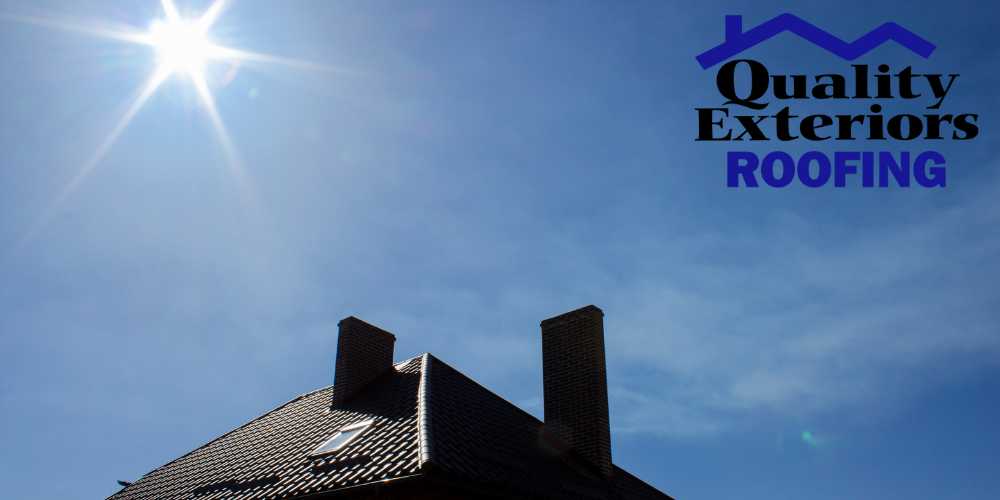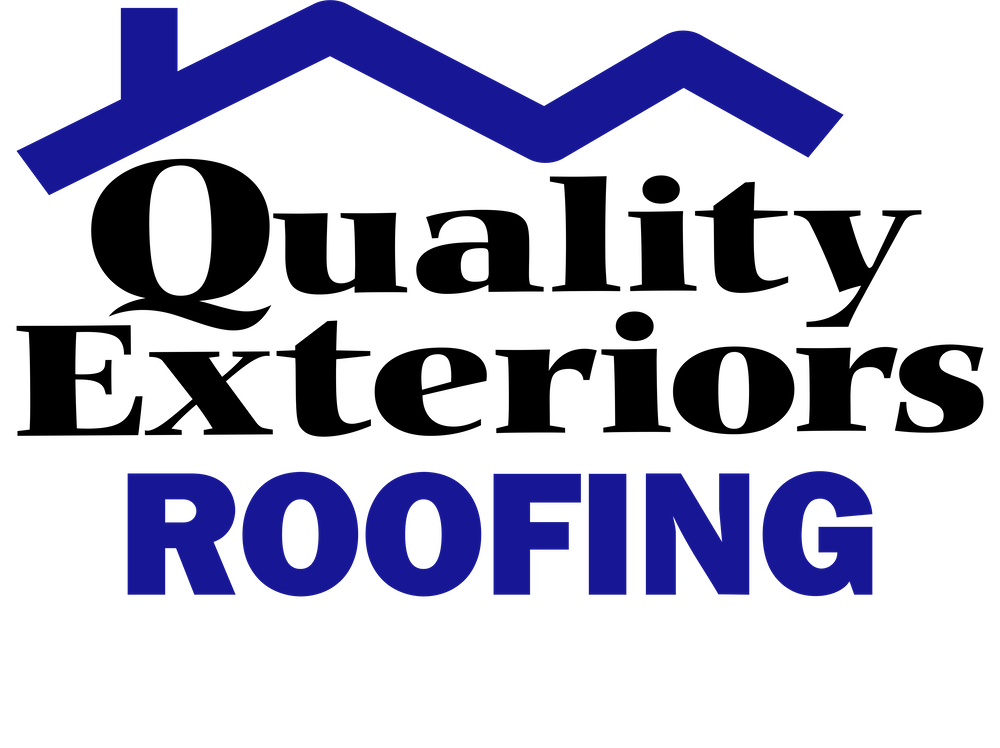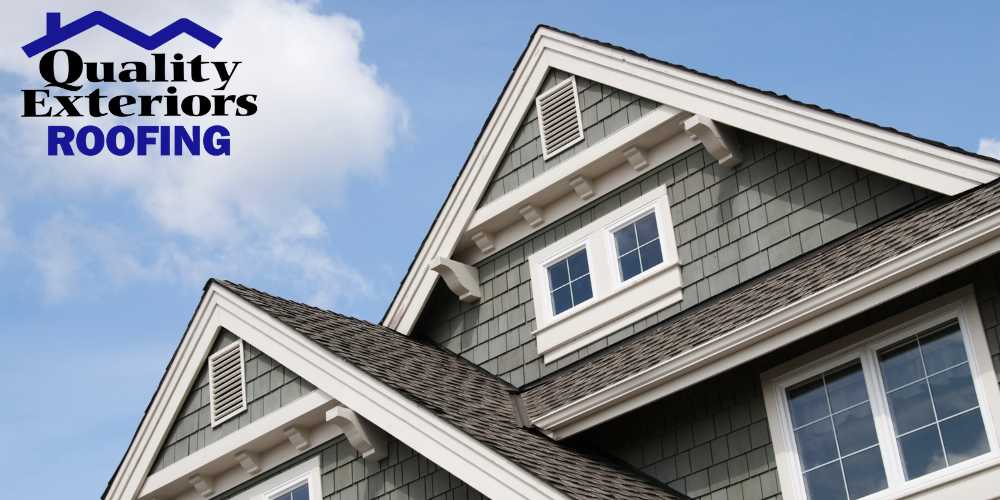How long does a roof last? The roof’s life expectancy depends on several factors, primarily the roofing material used. Asphalt shingles, one of the most common roof types, typically last 20-25 years, while metal roofing can endure for 40-70 years. Tile and slate roofs have an even longer roof lifespan, often exceeding 50 years. Environmental conditions, such as severe weather and sun exposure, can lead to a lower roof life expectancy and necessitate earlier roof replacement. It’s essential to get a regular roof inspection, as annual roof inspections help homeowners find prior storm damage and allow roofing contractors to perform necessary roof repairs to prolong the roof’s life span life. If you’re unsure about your roof’s condition, the Bossier City roofing contractors at Quality Exteriors offer a free roof inspection in Bossier City to help determine if it’s time to replace your roof. Regular maintenance and timely repairs are crucial in ensuring your roof lasts as long as possible.
Roof Lifespan by Roofing Materials
When determining ‘how long does a roof last?’ The first thing we’ll look at is materials. The roof’s lifespan is directly influenced by the type of roofing materials and whether the roof materials were properly installed.
How Long Does an Asphalt Shingle Roof Last?
An asphalt shingle roof is a popular choice among homeowners due to its affordability, versatility, and relatively easy installation process. The cost of a shingle roof cannot be beaten. Asphalt shingles are made from a composite of asphalt and fiberglass or organic materials and are the primary component of asphalt shingle roofs. Asphalt shingle types come in different styles, including three-tab asphalt shingles and architectural asphalt shingles. An asphalt roof is known for its durability and aesthetic appeal, and an asphalt shingle roof will typically last between 15 to 30 years, depending on external conditions, maintenance, and the quality of the asphalt shingles themselves.

Three Tab Asphalt Shingles
Three-tab asphalt shingles are a type of roof material commonly used in residential construction.
While the asphalt shingle roof is known for its affordability and straightforward installation process, three-tab roof shingles generally provide a shorter roof life expectancy compared to other roof materials. On average, the life expectancy of a three-tab asphalt shingle roof ranges from 15 to 25 years, depending on climate conditions, maintenance, and the quality of the tab asphalt shingles installed.
Architectural Asphalt Shingles
Architectural asphalt shingles are a premium roofing material distinguished by their multi-dimensional appearance and enhanced durability. Unlike traditional three-tab asphalt shingles, architectural shingles feature a more robust construction with multiple layers and varying shapes, creating a textured and visually appealing roof surface.
Architectural shingles offer a longer roof lifespan compared to other types of shingles, typically lasting between 25 to 30 years or more. The superior durability and aesthetic qualities of architectural shingles make them a popular choice for homeowners wanting to make a roof last.
How Long Does a Metal Roof Last?
A metal roofing system is constructed from metal panels or shingles, offering a durable and long-lasting solution for residential and commercial buildings. The roofing material, typically made from steel, aluminum, or copper, provides excellent protection. Metal roofs are available in a variety of styles and colors. The metal roof cost compared to asphalt shingle roofs is much higher, but the roof’s life expectancy is much longer.
Metal roofs are known for their longevity, often outlasting other types of roof systems. With proper installation and maintenance, metal roofs can have a roof life expectancy of 40 to 70 years or more. This extended roof’s lifespan makes metal roofing an attractive option for homeowners seeking a durable and low-maintenance roofing solution.
Call QEI for Bossier City metal roof installation services.
Other Roofing Materials
Other roofing materials include clay tile, concrete tile, slate tile, wood shingles, and flat roofs. Each roofing material offers distinct characteristics: clay and concrete tiles for durability and aesthetics, slate for longevity, wood shingles for a natural look, and flat roofs for modern designs.

Clay Tile Roofs
Clay tile roofs, also known as clay shingles, are materials made from natural clay that are molded into various shapes and sizes. Clay tile roofs are renowned for their timeless aesthetic appeal, durability, and resistance to fire, insects, and rot.
Clay tile roofs can last for decades, with a typical roof’s life expectancy ranging from 50 to 100 years or more when installed properly and maintained. The longevity of clay shingles makes them a popular choice for homeowners seeking a durable and long-lasting roofing solution that adds charm and character to their homes.
Concrete Tile Roofs
Concrete tile roofs are a type of roofing system made from molded concrete materials. These tiles are designed to mimic the appearance of traditional clay or slate tiles while offering enhanced durability and weather resistance. Concrete tiles are available in various shapes, sizes, and colors.
A concrete tile roof’s life span can be 30 to 50 years or more. Their longevity and durability make them a popular choice for homeowners seeking a roofing material that combines aesthetic appeal with long-term performance and value.
Slate Tile Roofs
Slate tile roofs are constructed using natural slate roofing tiles, which are quarried from sedimentary rock. Slate roofing is known for its timeless elegance, durability, and resistance to fire, rot, and insect damage. Slate roofing also offers exceptional longevity, with the roof’s life expectancy being well over a century with proper installation and maintenance. The slate tile roof’s longevity is attributed to the inherent strength and durability of the slate, making it one of the longest-lasting materials available.
While the initial cost of roofing installation may be higher compared to other options like asphalt shingle roofs, the long-term value and beauty of slate roofing make it a desirable choice for homeowners seeking a visually striking roofing solution.
Wood Roof
A wood shingle roof or shake roof is made from wood shingles, typically crafted from cedar, redwood, or pine. These wood shingles, also known as wood shakes, are renowned for their natural, rustic appearance, adding warmth and charm to any home. While a wood shake roof offers aesthetic appeal, the roof’s lifespan can vary depending on factors such as climate, maintenance, and the type of wood shakes that are used.
On average, the wood shingle roof’s lifespan is last between 20 to 40 years. Proper care, including regular inspections, roof repairs, and treatments to prevent moisture damage and decay, can extend the longevity.
Despite their shorter roof life expectancy compared to other roofing materials, many homeowners are drawn to their timeless beauty and organic feel. We cover more in our shake roof guide.
Flat Roof
While flat roofs offer certain design advantages, such as additional usable space for rooftop gardens or solar panels, they also present unique challenges in terms of drainage and maintenance.
The life expectancy of a flat roof varies depending on several factors, including the quality of materials used, climate conditions, and maintenance practices. On average, a well-constructed and properly maintained flat roof can last between 10 to 30 years.
What Affects a Roof’s Life Span
Several factors can influence the life span of a roof. Sufficient ventilation and insulation play vital roles in regulating temperature and moisture levels within the attic space, affecting the longevity of the roof structure. Weather conditions and sun exposure can also cause wear and tear over time, impacting the overall durability and life expectancy of the roof.
Roofing Materials
The choice of materials significantly impacts the life span of a roof. Proper maintenance is essential regardless of the material used. An asphalt, for example, are popular for their affordability, but typically have a shorter life span compared to premium options like slate roofing. Wood roofs can offer charm and character, but they require meticulous maintenance to combat issues like rot and insect damage, which can shorten their life span if neglected.
Low-quality roofing materials may deteriorate more rapidly, leading to premature failure or a sagging roof, while high-quality materials are designed to withstand the elements for longer periods. Ultimately, investing in high-quality roofing materials, such as slate roofing, can ensure a roof lasts for decades, providing long-term protection and value for homeowners.
Roof Installation
The proper installation is key in determining lifespan for all roof types. Whether it’s an asphalt roof, wood, metal, or another material, correct installation ensures that the roof can effectively withstand environmental stresses and perform as intended.
A roof that is properly installed is less likely to experience issues such as leaks, premature deterioration, or structural damage over time. Skilled installation techniques, including appropriate flashing, sealing, and underlayment, are essential for preventing water infiltration and ensuring the roof’s longevity.
Adherence to manufacturer specifications and local building codes during installation also helps to maximize the roof’s performance and lifespan, providing homeowners with peace of mind and long-term protection for their property.
Roof Maintenance
Regular roof maintenance can extend the life span of any type of roof, whether it’s a metal roof, slate roof, or asphalt roof. By addressing minor issues promptly and conducting routine inspections, homeowners can prevent small problems from escalating into larger ones that may require costly repairs or even premature roof replacement. Frequent roof repairs and proactive maintenance efforts, such as cleaning gutters, removing debris, and inspecting for signs of damage, help to identify and address potential issues before they compromise integrity, calling for an early roof replacement.
Investing time and resources into regular roof maintenance can significantly prolong a roof’s life expectancy, ultimately saving homeowners money and hassle in the long run.
Ventilation and Insulation
Proper ventilation can preserve roof life by ensuring air circulates effectively throughout the attic space, preventing moisture buildup and reducing the risk of condensation. Without adequate ventilation, moisture can accumulate, leading to the deterioration of roofing materials, such as wood rot or mold growth.
Moreover, poor roof ventilation can cause shingles to overheat during hot weather, accelerating their degradation and shortening the roof’s life. With sufficient insulation though, temperatures and fluctuations can be regulated within the attic, reducing the workload on the roof and minimizing thermal stress.
Weather and Sun Exposure
Weather conditions and sun exposure can significantly impact and lower roof life expectancy.
For example, an asphalt roof, which is common in many households, is susceptible to deterioration from prolonged exposure to the sun, causing overheated shingles to crack over time, ultimately accelerating potential roof damage.
A metal roof, on the other hand, may experience expansion and contraction under extreme temperature fluctuations, potentially leading to premature wear and tear. Concrete tiles and slate roofs generally fare better against the sun, but storm damage associated with high winds can dislodge or damage these heavier materials. A wood roof, while charming, are particularly vulnerable to the sun and high winds, resulting in a lower life expectancy if not properly maintained.

How to Know if You Need a New Roof
How do you know if your roof is damaged beyond repair? Determining whether you need a new roof involves several key considerations.
First, assess the age of your current roof. Most roofs have a lifespan ranging from 20 to 50 years, depending on the material. Visible signs of wear such as missing, cracked shingles indicate potential roof deterioration. Water stains on ceilings or walls can also suggest leaks and underlying damage.
If you’ve had frequent repairs or noticed widespread issues across your roof, it may be more practical to contact a roofing contractor and opt for a replacement rather than continuing to patch up problems. You’ll also want to understand how the roof age and insurance work.
How to Improve Roof Life Expectancy
Improving the roof’s life expectancy involves several key strategies tailored to different roof types and conditions.
First, consider the material of your roof, as each type has a different life span. Regular inspections and proactive maintenance can help identify and address minor issues before they escalate into significant problems, thereby extending your roof’s life. When damage is detected, prompt repairs are crucial to prevent further deterioration.
Ensuring proper ventilation and insulation in your attic space can help regulate temperature and moisture levels, reducing the risk of roof damage such as sagging roofs due to moisture buildup. When it’s time for a roof replacement, consider investing in high-quality materials and professional installation to maximize longevity.
By adopting these preventative measures and proactive maintenance practices, homeowners can significantly improve the roof’s life expectancy, protecting their investment and ensuring long-term structural integrity.
Roof Lifespan FAQs
Do you have questions about the life span of your roof? Whether you have a question about roof repair, curious about roof shingles, or considering a full roof replacement, we’ve got answers to guide you through your decision making process.
How Long Do Roofs Last?
Roof life span varies depending on several factors, including the type of roof and the quality of materials used. Generally, asphalt roofs, one of the most common types, last between 15 to 30 years. More expensive roofing materials, such as slate or metal, can extend a roof’s lifespan to 50 years or more. Proper maintenance, including annual roof inspections and timely repairs, can significantly prolong the life span of any roof.
Investing in regular inspections and addressing repairs promptly can help identify and mitigate issues before they escalate. While high-quality materials may be more expensive upfront, they can provide long-term cost savings by lasting longer and requiring fewer repairs over time, extending the time before a new roof is needed.
How Long Do Metal Roofs Last?
With proper maintenance and regular inspections, a metal roof lasts on average 40 to 70 years. They offer superior resistance to weather elements, pests, and mold compared to traditional options like asphalt shingle roofs. With their exceptional durability, a metal roof can provide homeowners with reliable and long-lasting roofing solutions.
How Long Does a Shingle Roof Last?
Shingle roofs typically last between 15 to 30 years, with premium materials like architectural asphalt extending the lifespan to 30 years or more. Regular roof maintenance in Bossier, such as inspections and repairs, are necessary to prolong the life of the roof. Factors like weather conditions and the presence of moss or algae can also affect the duration of roof shingles.
How Long Do Asphalt Shingles Last?
An asphalt roof typically lasts between 15 to 30 years, depending on elements like quality, climate, and maintenance. Regular inspections and prompt repairs for issues like roof leaks are crucial for extending the roof’s life. External issues like weather exposure and the presence of moss or algae can also affect the roof shingles durability over time.
How Often to Replace Roof?
Determining when to replace your roof depends on many things like type of roof, climate, and installation. Signs such as a sagging roof, widespread roof leaks, or damaged roof shingles indicate you may need a new roof. Consulting with a roofing contractor for regular inspections can help assess the condition of your entire roof and determine if full roof replacement is necessary.
Roof Replacement in Bossier City
For residents in Bossier City considering a new roof, Quality Exteriors Roofing is your trusted partner. Our roofing company specializes in providing top-quality roofing solutions tailored to your needs and budget. Our team will guide you through the process of roof replacement in Bossier City and provide you with a comprehensive roofing estimate.
Schedule your free roofing inspection in Bossier City now for a seamless and stress-free experience. Call (318) 747-1254 or complete our online intake form to schedule your inspection.

